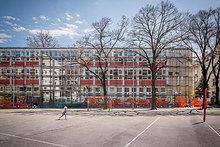Context
Energy efficiency in Serbia is currently at a low level. In relation to gross domestic product (GDP), Serbia uses six times more energy than Germany, with buildings accounting for almost forty per cent of energy consumption. There is still great scope for energy saving in all public buildings, such as schools and kindergartens. A lack of insulation, damage to buildings and outdated heating, air conditioning and hot water systems all contribute to the high level of consumption.
As a candidate for accession to the EU, Serbia has undertaken to introduce higher requirements for low energy consumption in buildings. The first steps along this path included the adoption of an energy efficiency law and an energy efficiency action plan.
Nevertheless, little improvement has been made so far, as overall conditions are not conducive to enhancing energy efficiency in public buildings. Current obstacles to greater efficiency include the absence of standards and regulations, the low political priority given to the issue and scarce investment funds. The situation is exacerbated by the fact that energy is subsidised, which means that savings from energy performance measures only pay off in the long term.
Objective
The general conditions for efficient energy use in public buildings in Serbia, particularly in schools and kindergartens, have improved. This includes guidelines and regulations that stipulate how public buildings can be rehabilitated to improve their energy performance. Craftsmen who have the skills required to carry out these measures at a high level are available.
Approach
The nationwide project on Energy Efficiency in Public Buildings focuses on the situation in the country’s 6,500 or so schools and kindergartens. It operates in four areas:
- improving the legal framework,
- introducing instruments to estimate the scope for saving costs and energy,
- setting up an advisory and information platform and
- training janitors and craftsmen.
The legislative institutions are given advice on how to adopt suitable regulations to implement the requirements of Serbia's national energy efficiency action plan. Staff working at public institutions, such as the Ministry of Education and local authorities, are trained to make accurate estimates of the costs incurred and the scope for energy saving by measures to enhance energy efficiency in buildings. To do so, cost assessments are prepared for various measures and buildings are assigned to different categories according to energy consumption. The project contributes international experience and facilitates contacts with experts from other countries that are already using these instruments successfully.
The project is encouraging stakeholders to set up an advisory platform under the responsibility of Serbian institutions. In this context, it is drawing on and refining an initiative by the University of Belgrade to establish a competence centre on energy efficiency. During study trips to Germany, the stakeholders can gather information from the German Federal Environment Agency, energy agencies and specialist institutes about their services and the way they work.
Instructors at Serbian training institutions acquire the necessary expertise to offer upskilling courses for janitors and craftsmen, which lead to higher quality in energy saving measures in public buildings and to better maintenance of these facilities. Mayors, councilors and other decision-makers are also informed about possibilities for enhancing energy efficiency in public buildings.
The project cooperates closely with a project of the same name by KfW Development Bank, which provides funding to rehabilitate schools with a view to improving their energy performance.
